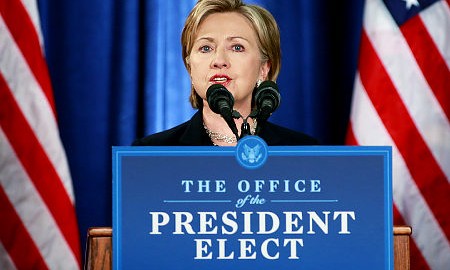This Saturday, hundreds of women descended on Yale Law School to take part in the 7th annual Yale Women in Leadership Conference. The theme was W.E. Women, promoting the idea of “women empowering women” in a positive and collaborative fashion. In order to cater to different interests, participants were able to select from a variety of sessions ranging from discussing females in tech start-ups to women in the sports industry.
Among the panels featured was one called “Madame President: Women Leading the Way in Law and Government.” Moderated by Stephanie Krent (LAW ’16), the panel consisted of Representative Elizabeth Esty (CT-5), Secretary of State Denise Merrill, Professor Heather Gerken and Kelly Barrett, a public defender, all formidable women in their respective fields. Krent began by having each woman introduce herself and share her background with the audience. I found myself at the edge of my seat as the women outlined their impressive resumes.
After introductions, the crowd looked visibly engaged, all eager to hear what these leading women had to say. Krent immediately brought the issue of a lack of women in law and government to the forefront of the discussion, prompting the panel to give their thoughts on potential causes and solutions to the problem at hand.
Gerken emphatically agreed with Krent, nothing that “we aren’t as far along as we ought to be” and that she “finds it depressing” that we have yet to make significant strides to change this issue. She cited her own workplace as an example, saying that only a small percentage of tenured professors at top law institutions, such as Yale, are women. She condemned the fact that some schools utilize a double counting method, often including non-tenured female faculty members to up their final gender count. However, she admitted to still falling prey to one of the antiquated standards, the idea that women who have children pre-tenure are not serious about their profession. She stated that although she did have one child pre-tenure, she still had inklings of fear that her fellow faculty members may not take her as seriously as before.
Kelly supported Gerken’s assertions by sharing that her area of expertise, criminal defense, is also heavily male dominated. On occasion, Kelly noted, she finds herself walking into a courthouse and realizing that she is the only woman in a room teeming with male lawyers, male prosecutors, male judges, male criminals and male bailiffs. That being said, Kelly remained optimistic that there is some change occurring by mentioning that in her current federal defense office, half of the lawyers are female. However, she was adamant that “we need to see a movement” even more significant and universal.
Esty began with a statistic that has inherent shock value: the fact that only 20% of the members of Congress are women. She continued by sharing an unfortunate story of her swearing in, noting that all the guards nodded and congratulated her husband on his election win. Merrill spoke of a room that was dubbed “men only” at her workplace wherein a scantily clad girl jumped out of a birthday cake for one of the celebrations hosted there. Such anecdotes provided further evidence to the prevailing notion that women still have yet to receive equal respect (let alone equal pay).
The general consensus of the panel in terms of why there was such a disparity in genders serving in law and government came down to two reasons: a lack of female networking experience and the invasive media surrounding female politicians. Gerken stated that “networks are the biggest problem” because it is harder for women to get into them since they tend to be seniority based and skewed towards men. Esty reasoned that “the anonymity of the internet has led to irresponsibility and meanness,” allowing the public to target female politicians with an intensified hatred without accountability for what they are saying. Merrill corroborated Esty by adding that fewer women are inclined to pursue a career where both her private and public life draw criticism at any given moment.
Yet, Esty gestured at her fellow panel members and said,“We’re here because we are passionate about politics.” She continued, that mentality alone was enough to drive any woman through political careers seemingly helmed by men. All four agreed that the best solution would be to support and encourage young women who have decided to pursue a career in law and government. Tying into the theme of “women empowering women,” the panel lauded the idea of inspiring girls to take on positions of leadership. Esty said, “We need more women in elected office.” That we do.
But, in an era where Hillary Clinton is gearing up for a potential presidential run and more women than ever are considering entering the fields of law and government, there is hope that the gender gap will begin to close, that women of this generation and those to come will embrace the idea of becoming lawyers and politicians. And standing in the presence of four women who had already done so, I couldn’t help but feel that the movement had already begun.

